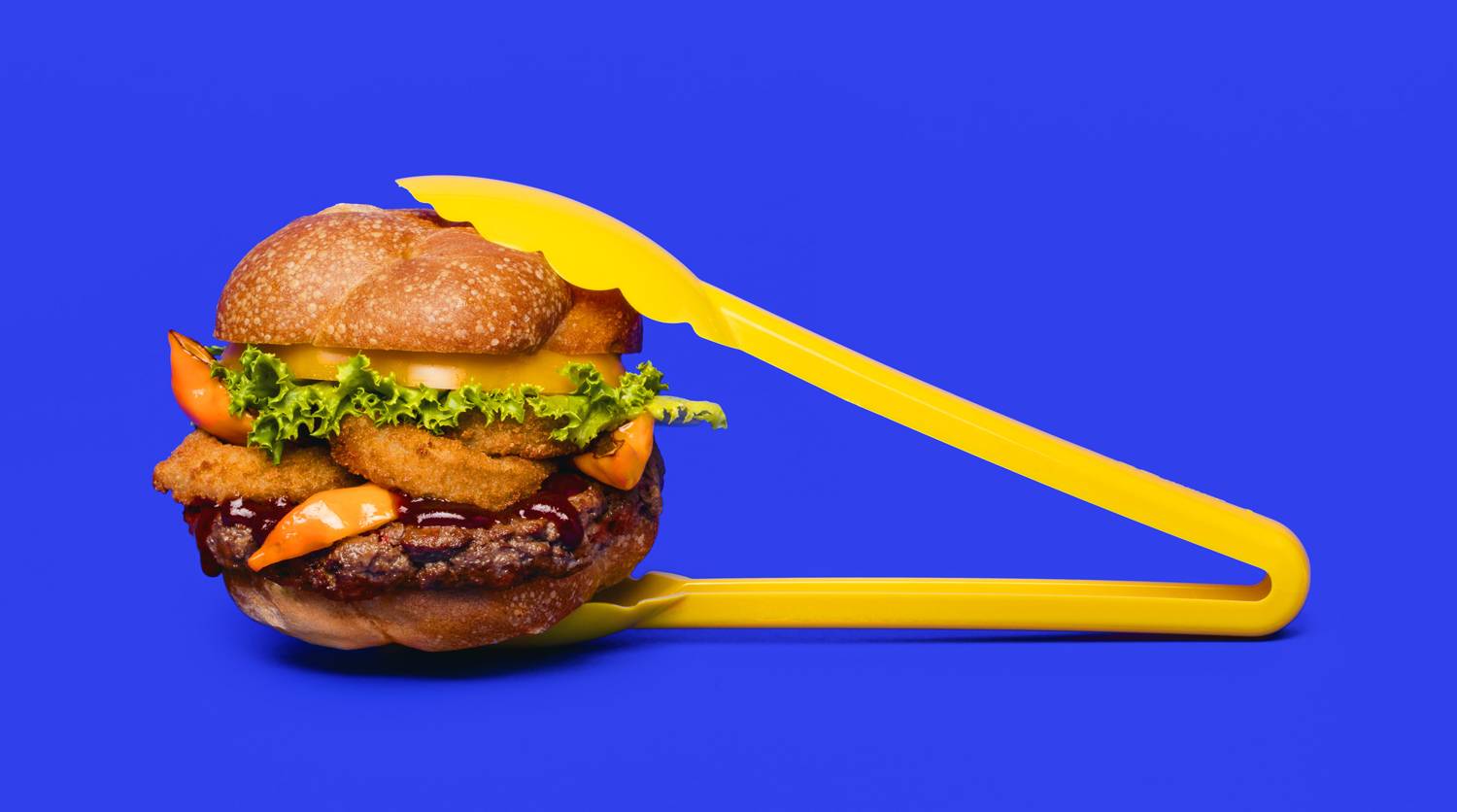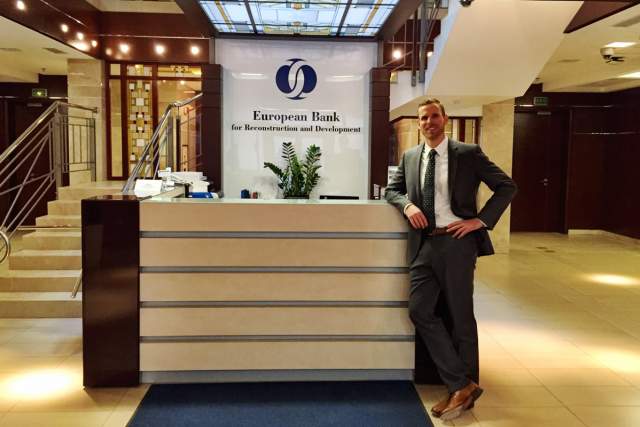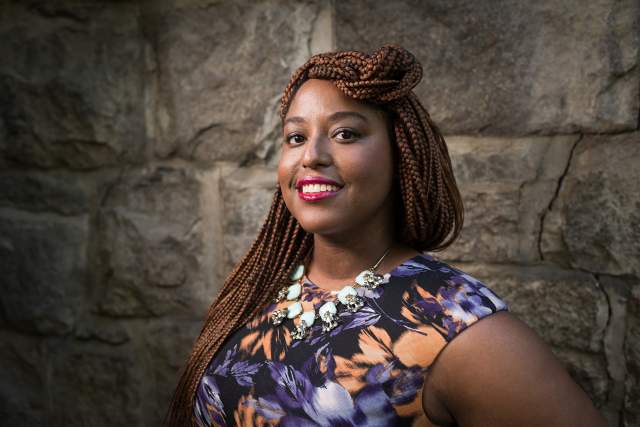The MBA Summer Internship, 5 Ways
The Class of 2018 spread out across countries and companies for their summer internships.

“The impact they have is massive,” says Blair Crichton T’18 of Impossible Foods. | photo: Impossible Foods
From Tesla to vegan burgers, here are a few highlights from a summer spent learning and doing.
Katrina Goulden T’18, Thomson Reuters Corporation
Katrina Goulden is one of a handful of Tuck students whose MBA education is sponsored by an employer. In Goulden’s case, it is Deloitte, where she worked as a strategy consultant. At Tuck, Goulden had the freedom to expand her skills and experience in whatever direction she chose, with the knowledge that she will put them to use when she returns to Deloitte after graduation.
Goulden came to Tuck looking for more experience with big data and analytics and, as a dual U.S./U.K. student, for experience at an international firm. Through the on-campus recruiting program, Goulden landed an internship at Thomson Reuters in London, working in a strategy role with the Reuters commercial policy team.
“Thomson Reuters is a really interesting company that’s changing a lot now,” she says. “It used to function based on acquisitions and it’s moving toward a more integrative strategy, trying to bring together those formerly independent companies or segments of their business into one more cohesive unit.”
Goulden worked on a team that was split between New York and London, which gave her insight on how multinational firms operate and collaborate across time zones. She worked on cutting edge new developments around social media, customer engagement, and pricing strategy, and was happy to see that all the analyses she did over the summer were rolled out and integrated into the way the company operates.
“One of the things the Thomson Reuters strategy program does well is find projects that give MBA students an opportunity to put some critical thought into the work and see that work come to fruition,” she says, “either while you’re there, or shortly thereafter.”
Blair Crichton T’18, Impossible Foods
When Blair Crichton got to Tuck, he decided he wanted to work at a for-profit company with a strong social mission. As someone concerned about climate change, Crichton searched the corporate landscape for internships in clean technology and renewable energy. He also looked at what he calls “outliers,” smaller companies with a particularly interesting product.
A vegan, Crichton eventually found Impossible Foods, a late-stage startup that makes Impossible Burgers: vegan burgers that taste very much like real meat hamburgers. “I chose Impossible Burgers over a couple of other options because the impact they have is massive, their growth story is really exciting, and they have some very high profile investors,” he says.
Crichton joined the strategy and business development team at the corporate headquarters in Silicon Valley, working on a variety of projects, including researching potential markets for international expansion, sales lead generation, and operations issues.
It was a pretty technical project. I got a mini chemistry degree over the summer.
But the project that challenged him the most was figuring out how to make money from much of the plant matter that doesn’t make it into the burgers. “It was a pretty technical project,” he says, “and I worked a lot with the science team, with chemical engineers, with the R&D team, as well as doing external market research. I kind of got a mini chemistry degree over the summer.”
He also put his Tuck education to work, using experiences from his FYP to formulate a go-to-market strategy, and recalling Management Communications for the presentations he had to give. Crichton even spoke with professors Thomas Lawton, visiting professor of business administration, and Paul Argenti, professor of corporate communication, for advice about international strategy and stakeholder engagement. “The Tuck experience helped me succeed in my internship, for sure,” he says.
Stephiney Foley T’18, Tesla
Stephiney Foley came to Tuck after serving in an operations role for seven and a half years in the Army. When she considered her options for a summer internship, she knew she wanted to do something in the technology field, but the details had to line up. “I looked at the mission and stage of many companies,” she says. “Tesla was the most exciting, since it was about to launch its new Model 3. Seeing this phase of a company is something I’ve never done before.”
Foley relocated to the Bay Area for the summer and expected to do a lot of operations work, since that was what she knew best. But it turned out that she could craft her summer work based on her interests, and her managers and supervisors gave her the flexibility to dream big.
She ended up completing five projects that will have a lasting impact on Tesla. In one, Foley worked on a strategy project focused on energy products in emerging markets, which allowed her to collaborate with Tesla Energy. Another example is an operations project on lean process management for Tesla’s global parts center. For that, Foley built a digital dashboard that helped the parts center understand its processes and make them more efficient.
Looking back, Foley has “huge job satisfaction,” she says, “because everything I produced was fully implemented, or my analysis was used in a larger project.”
Siena Hickey T’18, Frog Design
Siena Hickey’s favorite piece of career advice as an MBA student came during orientation, when Russell Wolff D’89, T’94, an executive vice president at ESPN, gave the keynote speech. “He said ‘If you know what you want to do, go do it. Don’t waste time trying to box yourself into a role that doesn’t excite you.’ That’s when I made the definitive decision that I wasn’t going to pursue a typical MBA career path,” she says.
While many of her classmates lined up summer internship interviews in the fall and winter, Hickey spent time learning about brand management and strategy and discovered her skills intersected in the field of design. In March, an opportunity came up at Frog Design, and she accepted an offer for an internship at its Brooklyn studio.
He said ‘If you know what you want to do, go do it. Don’t waste time trying to box yourself into a role that doesn’t excite you.’ That’s when I made the definitive decision that I wasn’t going to pursue a typical MBA career path.
Frog’s mission is to enhance the human experience through design, leveraging cross disciplinary teams of strategists, technologists, and designers. Hickey spent the summer on a major project for the firm, building a retail experience strategy for an international athletic brand’s first flagship store.
“I loved working with such a creative group and immersing myself in Frog’s user-centered design,” Hickey says. “Behind my interests in health and wellness, emerging markets, and brands is a fascination with consumers. It was such a thrill to have the opportunity to explore all those themes at once.”
As she considers full time roles after Tuck, Hickey knows patience will pay off again. “I’d really love to go back to Frog,” she says. “In the meantime, I’m building my network and exploring different avenues of product and service design. I’m passionate about staying in this space.”
Mark-Emmanuel Onyenyili T’18, Nestlé USA
Mark-Emmanuel Onyenyili identifies himself as a son of missionaries, and isn’t shy about sharing that he wants to lead a purpose-driven life. One of the ways he wants to make a positive impact is to design products or services for people in developing and frontier markets. That was just one of the 17 criteria he had for a summer internship. Another was to work in a branding or marketing capacity in South America or Africa. Out of the six internship offers he received, Nestlé USA was the best fit.
What came next was a fun bit of serendipity. After a week of training in Ohio, Onyenyili moved to Nestlé’s U.S. headquarters in Los Angeles and was assigned to a re-launching effort for the Wonka Chocolate brand.
Nestlé has owned the rights to Wonka Chocolate since the 1970s, but numerous product launches over the years haven’t been successful. Nestlé asked Onyenyili to first evaluate if there was indeed a market for Wonka, and if so, how to bring a Wonka product to life.
Onyenyili dove into the project, starting with basic research on the history of Wonka in the popular imagination. He eventually determined that Wonka should be re-launched as a seasonal item, during the Christmas holiday. Then he worked with people in finance, packaging, design, and product formulation. On the last day of his internship, he made a presentation to senior executives, including the president of the confections division, and brought with him some Wonka prototypes, mocked up in the Nestlé test kitchen.
“Nestlé is really working on bringing products to market faster,” he says, “and it was exhilarating to be a part of that.”

